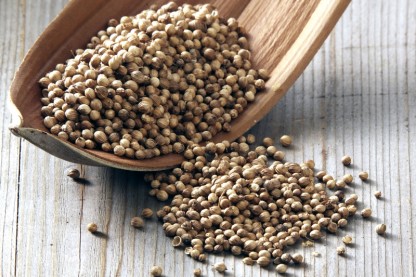7 Surprising Coriander Health Benefits: From Fighting Cholesterol to Treating Diabetes and More
You can use coriander for much more than adding flavor to cooking; coriander health benefits include lowering cholesterol and blood sugar, fighting illness, and protecting from cancer.
 I’ve always loved the taste of coriander in my cooking, but I recently learned that coriander uses aren’t limited to flavoring foods. There are many coriander benefits that earn this plant a starring role in both the spice and medicine cabinets.
I’ve always loved the taste of coriander in my cooking, but I recently learned that coriander uses aren’t limited to flavoring foods. There are many coriander benefits that earn this plant a starring role in both the spice and medicine cabinets.
Coriander refers to the plant Coriandrum sativum. The leaves of the plant in early growth are known as cilantro, and the dried seeds are called coriander seeds. In cooking, fresh cilantro can be incorporated into many dishes and it is often used as a garnish. Coriander seeds can also be ground up and used as a delicious spice.
Coriander Benefits/h3>
The stems, leaves, seeds, essential oil, and roots of this plant all possess healing capabilities and can help in the treatment of digestive problems, joint pain, coughs, bronchitis, inflammation, rheumatism, and other common complaints.[1,2] Studies show it can help to:
1. Combat oxidative damage. Coriander is a source of powerful antioxidants. Phenolic compounds like catechin, alkanals, apigenin, and lanalool are found in Coriandrum sativum. These kinds of antioxidants help to scavenge free radicals, which can be very detrimental to the body if not cleared properly.[3,4]
2. Fight cancer. Due in large part to its antioxidant capabilities, coriander is considered a possible tool to help treat cancer. Extract from the root of the plant has been shown to inhibit DNA damage, prevent cancer cell migration, and promote cancer cell death in laboratory studies.[3]
3. Treat diabetes. A study in the Journal of Food Science found that extracts from coriander stems and leaves lowered blood sugar levels in diabetes-induced laboratory rats.[4] The authors suggest that the antioxidants in coriander are at least partially responsible for these anti-diabetic effects. The extracts also may have helped β-cells regenerate, helping to control blood sugar better.
4. Lower cholesterol. Coriander extract leads to lower total cholesterol, LDL cholesterol, and triglycerides in rats fed a high-cholesterol diet.[2] Similar effects were also seen in diabetic rats with high lipid profiles; coriander supplementation resulted in lower LDL cholesterol and triglycerides.[4]
5. Fight infection. Coriander has potent antifungal and antimicrobial effects. In one study, coriander essential oil produced a strong antifungal effect against Candida species, which are responsible for yeast infections. Researchers believe that coriander has the ability to break down the cell wall of the pathogens, helping to prevent them from proliferating.[5] The results of one study found that coriander oil was effective against all bacteria tested. The authors “encourage the use of coriander oil in antibacterial formulations” because it so effectively kills the bad bacteria that can cause infection.[6]
6. Detoxify metals. Coriander may protect from lead poisoning, as it can act as a powerful detoxifying agent, ridding the body of toxic metals like lead.[2]
7. Improve memory. One study in 2011 found that memory deficits in mice could be reversed by the addition of coriander leaves to the diet for 45 days. With more research, coriander could have a role in managing conditions like Alzheimer’s disease.[7]
While larger trials on human subjects are needed to further understand the many potential coriander health benefits, this plant has some remarkable capabilities for improving your health. The leaves, stems, roots, and seeds of the plant all offer some benefit, so try adding fresh cilantro, whole coriander seeds, and coriander powder to your cooking. For the most potent form, you can purchase coriander oil, and add a few drops to a glass of water or a smoothie, or put them straight under your tongue for efficient absorption.
Share Your Experiences
Have you ever used coriander oil and experienced coriander benefits firsthand? Do you add coriander seed or cilantro to your dishes? Share your experience with this exceptional herb in the comments section below.
[1] Comp Biochem Physiol B Biochem Mol Biol. 2013 Sep;166(1):65-72.
[2] Phytother Res. 2013 Oct;27(10):1439-56.
[3] BMC Complement Altern Med. 2013 Dec 9;13:347.
[4] J Food Sci. 2012 Jul;77(7):T119-23.
[5] PLoS One. 2014 Jun 5;9(6):e99086.
[6] J Med Microbiol. 2011 Oct;60(Pt 10):1479-86.
[7] J Sci Food Agric. 2011 Jan 15;91(1):186-92.
Originally published in 2015, this post is regularly updated.


 WHITE COAT SYNDROME
WHITE COAT SYNDROME  News Briefs February 2024
News Briefs February 2024  Savor the Sweet Potato
Savor the Sweet Potato 